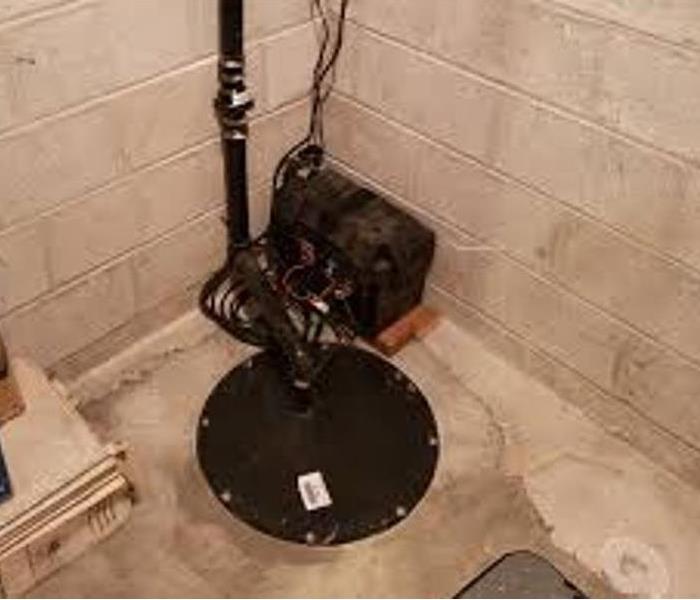Heavy Rains? Know How Your Sump Pump Operates.
10/7/2020 (Permalink)
How a Sump Pump Works
Typically, a sump pump is installed in a specially dug hole, known as the sump pit, which is located either in the basement or lowest level of your property. During heavy rainstorms or other scenarios that could cause potential flooding, the sump pump works by diverting all accumulating water outside your property. It’s important to ensure that the pump drains the water a safe distance away from your property’s foundation.
The majority of installed sump pumps are electric, meaning that they require a stable power source in order to work properly. However, there are some models that operate using your property’s pressurized water supply.
Common Causes of Sump Pump Failure
Much like any other plumbing device, it is important that you ensure that your sump pump is well maintained and free of any mechanical problems. Otherwise, you may be dealing with catastrophic damage to your property.
Some of the most common causes of sump pump failure include:
- Power failure: Heavy rainstorms not only bring about excess water. The weather conditions can also cause power outages, which will render your sump pump unable to properly drain the quickly accumulating water.
- A stuck switch: This is one of the most common mechanical issues that can occur with a sump pump. Caused either by debris jamming the float or a switch that has lodged itself against the side of the pump due to shifts within the basin, a stuck switch will cause the pump to be inoperable.
- An overwhelmed pump: Much like the other devices you install in your home, it’s important that you have a properly sized sump pump that is just the right horsepower. A sump pump that is too large will result in it overworking, which can dramatically shorten its lifespan. Similarly, one that is too small will cause it to have to work harder to keep up with demands, which results in a decreased lifespan as well.
- A frozen or clogged discharge pipe: Prince George’s County experiences its fair share of cold weather. If rainfall or excess water occurs during the winter, it has the potential to freeze over, rendering your sump pump ineffective. Similarly, it’s not uncommon for your sump pump’s discharge pipe to get clogged with debris, such as pebbles or loose gravel, dirt, sediment, or waste in the water. When the discharge pipe is no longer able to remove the excess water and divert it out of your property, it will, instead, allow the water to flow back down and into your basement or crawl space.
- Lack of maintenance: It’s important that you uphold a maintenance schedule for your sump pump. We recommend having it cleaned and inspected at least once a year to ensure that it is free from any potential clogs or damaged components.
- Old age: Sump pumps typically only last between 7 and 10 years. As it experiences wear and tear, it will become less and less effective at displacing rainwater. For maximum safety, we suggest investing in a new unit after 10 years.
- Improper installation: It’s important that you hire skilled technicians to install your sump pump for you. An improperly installed sump pump can lead to it failing when you need it most. Improper installation can be anything from setting the pump in gravel or dirt, not creating an air relief hole in the discharge line, or failing to install a check valve on the discharge line.
- A defective sump pump: Although rare, it could be that you received a defective unit and need to replace it. This is why we recommend testing the unit after installation.
The Dangerous Implications of Sump Pump Failure
The main purpose of a sump pump is to protect your property from any water damage due to flooding or a plumbing issue. Should your sump pump fail, you’re not only at risk for serious property damage, but your property is also susceptible to hazardous mold and mildew growth. Not only is the structural integrity of your property at risk, but so is your health and that of any other inhabitants, guests, employees, or customers. That's why it's important to have your water loss handled in the right way with our highly trained and certified technicians SERVPRO of Streamwood, Bartlett, West Chicago, & Warrenville.





 24/7 Emergency Service
24/7 Emergency Service
